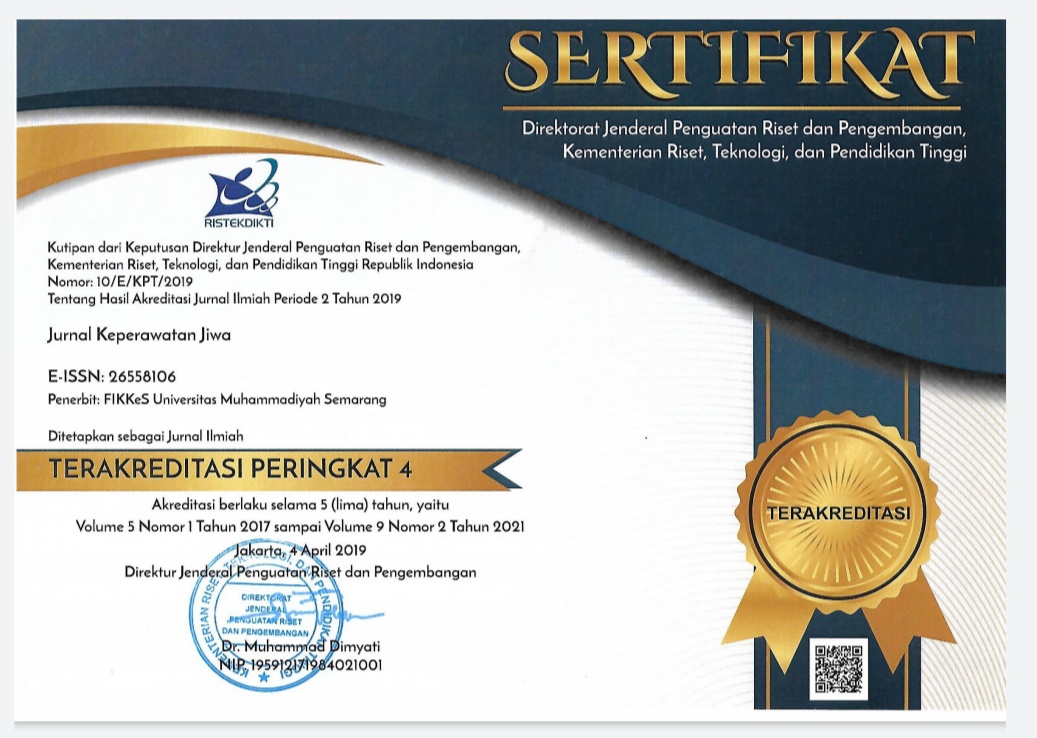Is the Spiritual Intelligence of Parents Related to Youth's Emotional Status and Sexual Behavior?
(1) Universitas Muhammadiyah Yogyakarta
(2) Universitas Muhammadiyah Yogyakarta
(*) Corresponding Author
Abstract
Related Research spiritual intelligence of parents with emosioal status and sexual behavior of teenagers. The purpose of knowing the relationship of sexual behavior and emotional status of adolescents with the spiritual intelligence of parents in work area Puskesmas Kasihan I. This study used a mix method design with sequential explanatory. Quantitative respondents were 132 adolescents and parents. Analysis of the data used in this quantitative study was control tau. The qualitative participants were 11 teenagers. Research interviews were conducted on 11 student participants who were taken by purposive sampling and qualitative data analysis using invivo software. The instrument used was the Spiritual Self-Report Inventory (SISRI), Strengths and Difficulties Questionnaire (SDQ), Sexual Behavior. Qualitative instruments use interview guides, telephone and observation sheets. The results showed that 101 adolescents with abnormal emotional status, 15 boderlines, 4 normal respondents. Adolescent sexual behaviors that are positive or active are 44 teenagers and 89 adolescents are negative or inactive behaviors. Found three factors that influence the emotional status and sexual behavior of adolescents, namely the role of moral education from parents, social control and adolescent self-control ability. The role of parents, the environment and adolescent self control affect the emotional status and sexual behavior of adolescents.
Keywords
Full Text:
PDFReferences
Afrilia, A. M. (2018). Personal Branding Remaja di Era Digital. Mediator: Jurnal Komunikasi, 11(1), 20–30. https://doi.org/10.29313/mediator.v11i1.3626
Andriani, Y., Raranignrum, V., & Yunita, R. D. (2019). Faktor yang Berhubungan dengan Perkembangan Anak Usia Pra Sekolah di TK Nurul Husada Kalibaru Banyuwangi. Jurnal Ilmiah Kesehatan Rustida, 5. http://e-journal.akesrustida.ac.id/index.php/jikr/article/view/69
Batubara, J. R. L. (2010). Adolescent Development (Perkembangan Remaja). Sari Pediatri, 12(1), 21–29. http://saripediatri.idai.or.id/pdfile/12-1-5.pdf
Desmita. (2016). Psikologi Perkembangan (Sepuluh). PT Remaja Rosdakarya.
Fathu Lillah, M. (2015). TA’LIM MUTA’ALIM (M. Muqqoyimul Haq (ed.); edisi I). Santri Salaf Press.
Leanna, C. R. F., Erin, F., & Titus, J. M. (2013). Faith-Based Sex Education Programs : What They Look Like and Who Uses Them. 247–262. https://doi.org/10.1007/s10943-011-9463-y
Meeus, W. (2016). Adolescent psychosocial development: A review of longitudinal models and research. Developmental Psychology, 52(12), 1969–1993. https://doi.org/10.1037/dev0000243
Nashih’Ulwan, A. (2017). PENDIDIKAN ANAK DALAM ISLAM (J. Manik & A. Wicaksono (eds.); I). Insan Kamil.
Nur Utami, A. C., & Raharjo, S. T. (2019). Pola Asuh Orang Tua Dan Kenakalan Remaja. Focus : Jurnal Pekerjaan Sosial, 2(1), 150. https://doi.org/10.24198/focus.v2i1.23131
Rahman, A. A. (2017). Psikologi Sosial. Rajawali Pres.
Saifuddin, A. (2015). Abnormalitas Perilaku pada Anak dan Remaja, Sudah Sebegitu Parahnya?? Proceeding Seminar Nasional “Selamatkan Generasi Bangsa Dengan Membentuk Karakter Berbasis Kearifan Lokal,” 216–232. https://publikasiilmiah.ums.ac.id/bitstream/handle/11617/6502/24-Ahmad Saifuddin.pdf?sequence=1&isAllowed=y
Situmorang, Z. R., Hastuti, D., & Herawati, T. (2016). Pengaruh Kelekatan dan Komunikasi dengan Orang Tua terhadap Karakter Remaja Perdesaan. Jurnal Ilmu Keluarga Dan Konsumen, 9(2), 113–123. https://doi.org/10.24156/jikk.2016.9.2.113
Subandi, M. A. (2016). Psikologi Agama & Kesehatan Mental. Pustaka Belajar.
Sulistiowati, N. M. D., & dkk. (2018). Description of Social Support Toward Emotional , Psychology and Social Wellbeing Among Adolescent ’ S Mental Health. Jurnal Ilmiah Permas: Jurnal Ilmiah STIKES Kendal, 8(2), 116–122. https://doi.org/https://doi.org/10.32583/pskm.8.2.2018.116-122
Unayah, N., & Sabarisman, M. (2015). the Phenomenon of Juvenile Delinquency and Criminality. Sosio Informa, 1(2), 121–140. https://doi.org/http://dx.doi.org/10.22146/jpsi.6959
Yaunin, Y., & Lestari, Y. (2016). Artikel Penelitian Faktor-Faktor yang Berhubungan dengan Perilaku Seksual Remaja di Kota Padang. 5(2), 448–455.
Article Metrics
Abstract view : 279 timesPDF - 43 times
DOI: https://doi.org/10.26714/jkj.8.4.2020.443-450
Refbacks
- There are currently no refbacks.
PPNI Univ. Muhammadiyah Semarang
Jl. Kedungmundu Raya No. 18 Semarang Gedung NRC University of Muhammadiyah Semarang
Phone: 02476740287
Fax: 02476740287
Email: [email protected]
This work is licensed under a Creative Commons Attribution 4.0 International License.


